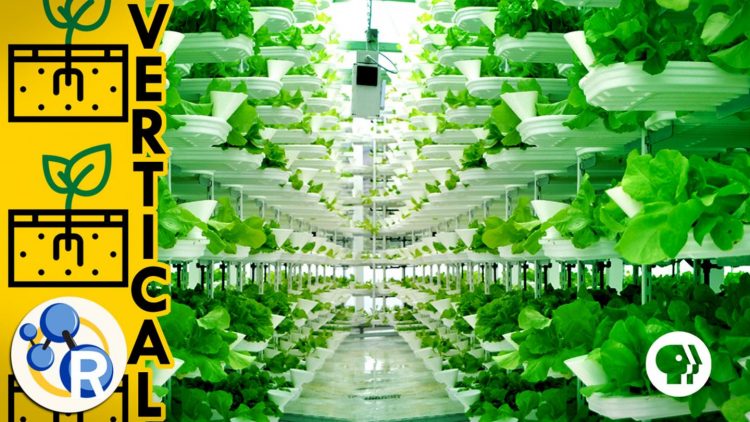The farm of the future?

There's a new trend in agriculture called vertical farming. Familiar farms are outside with horizontal fields. But modern technology now allows us to stack fields vertically, just as we've stacked housing into apartment buildings. Moving plants indoors has many benefits: shelter from unpredictable weather, a reduced need to clear land for farming, and better runoff control. But lighting can make or break the cost for urban agriculture. Watch the Reactions video here: https://youtu.be/rEw-VfFkUik. Credit: The American Chemical Society
There's a new trend in agriculture called vertical farming. As humans learned to farm, we arranged plants outside in horizontal fields, and invented irrigation and fertilizer to grow bumper crops. But with modern technology and farmers' cleverness, we can now stack those fields vertically, just as we stacked housing to make apartment buildings.
Moving plants indoors has many benefits: Plants are not at the mercy of weather, less wilderness is cleared for farmland, and it's easier to control the runoff of fertilizer and pesticides.
But the choice of lighting can make or break the cost of a vertical farm and affect how long it might take for urban agriculture to blossom. Watch the latest Reactions video here: https:/
###
Subscribe to the series at http://bit.
The American Chemical Society is a nonprofit organization chartered by the U.S. Congress. With nearly 157,000 members, ACS is the world's largest scientific society and a global leader in providing access to chemistry-related research through its multiple databases, peer-reviewed journals and scientific conferences. The American Chemical Society does not conduct research, but publishes and publicizes peer-reviewed scientific studies. Its main offices are in Washington, D.C., and Columbus, Ohio.
To automatically receive news releases from the American Chemical Society, contact newsroom@acs.org.
Media Contact
All latest news from the category: Agricultural and Forestry Science
Newest articles

NASA: Mystery of life’s handedness deepens
The mystery of why life uses molecules with specific orientations has deepened with a NASA-funded discovery that RNA — a key molecule thought to have potentially held the instructions for…

What are the effects of historic lithium mining on water quality?
Study reveals low levels of common contaminants but high levels of other elements in waters associated with an abandoned lithium mine. Lithium ore and mining waste from a historic lithium…

Quantum-inspired design boosts efficiency of heat-to-electricity conversion
Rice engineers take unconventional route to improving thermophotovoltaic systems. Researchers at Rice University have found a new way to improve a key element of thermophotovoltaic (TPV) systems, which convert heat…



